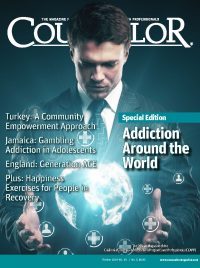Share
Dear Dr. Toni,

I’m a thirty-nine-year-old woman who can’t seem to stop herself from giving advice. Is that an addiction? I’ve been told by my therapist that it is, and I saw your column in this magazine in her waiting room and I thought I’d get a free second opinion. I happen to be a psych intern and I’ve studied functional medicine for about five years, so I know about the mind-body connection. When people complain about their problems, whether they’re physical or mental problems, it seems to me that it’s my duty to share the resources I have. What do you think, Dr. Toni?
– Confused in Florida
Dear Reader,
Did your therapist suggest Al-Anon or Codependents Anonymous? Both programs provide a structure and a sponsor for you to determine if advice-giving is making your life unmanageable in some way. Do you assume that people cannot find these answers on their own? When people are complaining, do you ask whether they want you to give feedback or whether they want you to just listen? Also, I would invite you to go deeper and feel what emotion comes up when you know people are in pain. Do you want to fix them so that they do not bother you anymore, or do you want to fix them because you identify too strongly with their pain and feel that if you give them advice their pain is going to go away?
“Advice-a-holism” has the same root as alcoholism or any other addiction: you do not want to feel uncomfortable in the presence of pain, whether it is someone else’s or your own. The next time you feel the impulse to give advice to someone who is not paying you, try the following: drop into your body, using your breath and breathing through your mouth. Direct your breath into the place that is feeling uncomfortable or feeling compelled to say something, and just breathe, melting into the emotion that is present or the sensation if it is just constriction or tension. And when you feel some release, send unconditional love and acceptance to that emotion or sensation. Even our most compulsive states are an opportunity to experience communion with all parts of ourselves and ultimately wholeness through this integration.
Dear Dr. Toni,
Can a person become addicted to the fear of change? I notice that throughout my life, when it was time to make a change and I didn’t, I paid a big price with car accidents or illnesses. I ask this question because I’m faced with another big transition and I feel frozen to do anything about it. I make great money, but I’m bored and even a little depressed; I don’t know what else I can do for a living, so I stay in this job knowing it could eventually affect my health. Any thoughts you might have are greatly appreciated.
– Dazed and Confused
Dear Reader,
Fear of anything that eventually makes your life unmanageable over and over again is indeed what is called a “process addiction.” Working with a therapist trained in some kind of somatic energy clearing coupled with career coaching could help you move out of this pattern of waiting until you hit the wall, literally or figuratively. You are not alone in this pattern. Many people suffer from being crisis driven in their approach to change—waiting until they are forced to. You might say it is a national and even global dysfunction that has put us in the perilous environmental condition our world is in now.
This can be healed; I know it to be so. Good luck!

Toni Galardi, PhD
Toni Galardi, PhD, is a licensed psychotherapist and transitions expert in Marin County, California. She works with people by phone and Skype all over the world. She is also the author of The LifeQuake Phenomenon: How to Thrive in Times of Personal and Global Upheaval. She can be reached through her email address drtoni@drtonigalardi.com or at her office at 310-890-6832.











 Counselor Magazine is the official publication of the California Association of Addiction Programs and Professionals (CCAPP). Counselor offers online continuing education, article archives, subscription deals, and article submission guidelines. It has been serving the addiction field for more than thirty years.
Counselor Magazine is the official publication of the California Association of Addiction Programs and Professionals (CCAPP). Counselor offers online continuing education, article archives, subscription deals, and article submission guidelines. It has been serving the addiction field for more than thirty years.